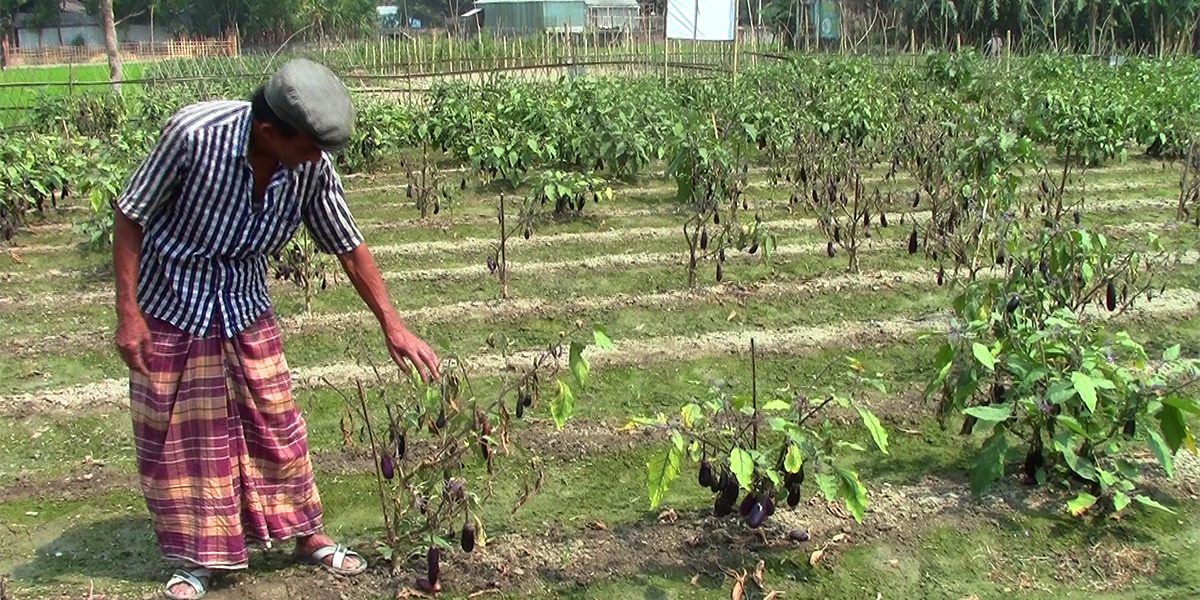
Cornell promoters of the GM Bt brinjal project in Bangladesh have published a paper on the crop’s performance that has an oddly narrow focus – and doesn’t mention Bangladesh, where the crop suffered widespread failure
Last month, to a curious absence of publicity, a paper was published in the journal PLOS One, claiming that GM Bt insecticidal brinjal (eggplant) gives “outstanding control” of the fruit-and-shoot borer pest and "can dramatically reduce the need for conventional insecticides”.
The authors include Cornell University’s promoters of the GMO Bt brinjal project in Bangladesh, Tony Shelton and Frank Shotkoski.
In proclaiming the success of Bt brinjal, the new paper, just like the BBC in its controversial promotional for the crop, only focuses on a single trait: expression of the Bt insecticidal toxin that confers resistance to the fruit-and-shoot borer.
The paper doesn’t mention bacterial wilt, premature dying out of plants, unattractiveness in the marketplace, or any of the other serious problems reported by Bangladeshi farmers who actually grew the crop.
It also doesn’t measure actual pesticide usage or yield, even though these factors are crucial to the crop’s success in real farming conditions. Reports from within Bangladesh show that farmers growing Bt brinjal were given a large arsenal of chemical pesticides to spray on crop, including banned ones. But that didn’t save the crops, as yields were poor.
In fact, the new paper doesn’t present any data at all on the Bangladeshi experience with Bt brinjal, even though the crop has been growing in farmers’ fields since 2014. Instead it deals only with data from controlled field trials in the Philippines.
Narrow focus
The paper’s extremely narrow focus on just the fruit-and-shoot borer resistance in controlled field trial conditions allows it to claim success for a GM crop that has, according to farmer accounts, proved a widespread failure in the field.
To show how spurious this reasoning is, consider a parallel hypothetical example from organic farming. A tomato bred for blight resistance and intended to be grown by organic farmers in non-chemical-pesticide systems does not contract blight. So the intended trait works. However, many of the tomato plants fall victim to a bacterial wilt disease. The surviving plants prove difficult to sell because the taste and texture are unattractive to shoppers.
Would researchers hype this tomato as a triumph of conventional breeding or organic agriculture? Unlikely. It would quickly become a laughing stock. But this is exactly the type of reasoning that GMO promoters expect us to accept in order to justify claims that the crop is a success.
Zero data for Bangladesh
The new paper confirms that those promoting Bt brinjal in Bangladesh as a success still have zero data to back up their claims.
I wouldn’t be surprised if no scientific papers appear on the Bangladeshi Bt brinjal experience. That’s because the researchers would have to address the unfortunate failures mentioned above, as well as reports that government officials replaced plants that died out, making any resulting data scientifically worthless.
Report: Claire Robinson. Image: Farmer Abul Hayet, Dhanua, Narsingdi, Bangladesh, showing disease-affected Bt brinjal plants in his field. Photo: Faisal Rahman and Delowar Jahan.
—
Field Performance of Bt Eggplants (Solanum melongena L.) in the Philippines: Cry1Ac Expression and Control of the Eggplant Fruit and Shoot Borer (Leucinodes orbonalis Guenée)
Desiree M. Hautea, Lourdes D. Taylo, Anna Pauleen L. Masanga, Maria Luz J. Sison, Josefina O. Narciso, Reynaldo B. Quilloy, Randy A. Hautea, Frank A. Shotkoski, Anthony M. Shelton
PLOS One, June 20, 2016. http://dx.doi.org/10.1371/journal.pone.0157498
http://journals.plos.org/plosone/article?id=10.1371%2Fjournal.pone.0157498
Abstract
Plants expressing Cry proteins from the bacterium, Bacillus thuringiensis (Bt), have become a major tactic for controlling insect pests in maize and cotton globally. However, there are few Bt vegetable crops. Eggplant (Solanum melongena) is a popular vegetable grown throughout Asia that is heavily treated with insecticides to control the eggplant fruit and shoot borer, Leucinodes orbonalis (EFSB). Herein we provide the first publicly available data on field performance in Asia of eggplant engineered to produce the Cry1Ac protein. Replicated field trials with five Bt eggplant open-pollinated (OP) lines from transformation event EE-1 and their non-Bt comparators were conducted over three cropping seasons in the Philippines from 2010–2012. Field trials documented levels of Cry1Ac protein expressed in plants and evaluated their efficacy against the primary target pest, EFSB. Cry1Ac concentrations ranged from 0.75–24.7 ppm dry weight with the highest in the terminal leaves (or shoots) and the lowest in the roots. Cry1Ac levels significantly increased from the Alexis Baden-Mayer to the reproductive stage. Bt eggplant lines demonstrated excellent control of EFSB. Pairwise analysis of means detected highly significant differences between Bt eggplant lines and their non-Bt comparators for all field efficacy parameters tested. Bt eggplant lines demonstrated high levels of control of EFSB shoot damage (98.6–100%) and fruit damage (98.1–99.7%) and reduced EFSB larval infestation (95.8–99.3%) under the most severe pest pressure during trial 2. Moths that emerged from larvae collected from Bt plants in the field and reared in their Bt eggplant hosts did not produce viable eggs or offspring. These results demonstrate that Bt eggplant lines containing Cry1Ac event EE-1 provide outstanding control of EFSB and can dramatically reduce the need for conventional insecticides.










